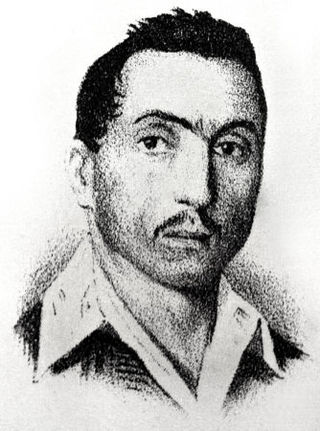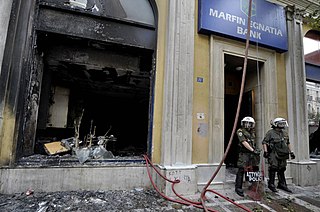Related Research Articles

Zagora is a village and a former municipality on the Pelion peninsula in Magnesia, Thessaly, Greece. Since the 2011 local government reform it is part of the municipality Zagora-Mouresi, of which it is the seat and a municipal unit. The municipal unit has an area of 96.101 km2.

A.P.O. Akratitos Ano Liosia is a Greek football professional club from Ano Liosia, Athens, Greece. They currently play in the Alpha Division of the Football League championship, which is the third level of the Greek football pyramid. They maintain a quite strong academy of youngsters.

Athens News was an English-language newspaper published in Greece. The paper had regular sections covering aspects of Greek news such as politics, social issues, business, arts & entertainment and sports, as well as international news. Features included analysis of domestic and foreign affairs by leading academics and experts, humour columns and reader contributions. During the dictatorship, Athens News was a leading voice against the junta, and its publisher Yannis Horn was jailed and threatened by the dictators.

Channel 9 was a Greek television channel broadcasting in the region of Attica. Despite being declared to be a news-based channel, the majority of the channel's programming since the early 2010s, has consisted of telemarketing.

The Second Hellenic Republic is a modern historiographical term used to refer to the Greek state during a period of republican governance between 1924 and 1935. To its contemporaries it was known officially as the Hellenic Republic or more commonly as Greece. It occupied virtually the coterminous territory of modern Greece and bordered Albania, Yugoslavia, Bulgaria, Turkey and the Italian Aegean Islands. The term Second Republic is used to differentiate it from the First and Third republics.
The Battle of Kamatero was an armed conflict during the Greek revolution between the Greek forces under the command of the Greek ex officer of the French army, Colonel Denis Bourbaki and the Ottoman forces led by Reşid Mehmed Pasha. The battle ended with the decisive victory of the Ottomans on the night of 27 January 1827 (O.S.) in Kamatero, Greece.

Mustapha Khaznadar, born as Georgios Halkias Stravelakis was a Tunisian politician who served as Prime Minister of the Beylik of Tunis from 1855 to 1873. He was one of the most influential people in modern Tunisian history.

The Second Siege of Missolonghi was the second attempt by Ottoman forces to capture the strategically located port town of Missolonghi during the third year of the Greek War of Independence (1823). The second siege is usually ignored however, and the name is often applied to the greater siege of 1825–1826.

Theodoros "Thodoris" Chatzitheodorou is a retired Greek water polo player and current coach.
Theodoros "Thodoris" Kalakonas is a Greek water polo player who competed in the 1996 Summer Olympics, and in the 2004 Summer Olympics with the Greece men's national water polo team. He was part of the national squad that won the silver medal at the 1997 World Cup in Athens and the Bronze Medal in the 2004 World League in Long Beach.
Ioannis Thomakos is a Greek water polo player who competed in the 2000 Summer Olympics, the 2004 Summer Olympics and the 2008 Summer Olympics with the Greece men's national water polo team. He was part of the national squad that won the silver medal at the 1997 World Cup in Athens. and the Bronze Medal in the 2004 World League in Long Beach.
Thomas "Themis" Khatzis is a Greek former water polo player who competed in the 1996 Summer Olympics and the 2000 Summer Olympics with the Greece men's national water polo team.
Georgios Psykhos is a Greek former water polo player who competed in the 1996 Summer Olympics, the 2000 Summer Olympics with the Greece men's national water polo team. He was part of the Greece national team that won the silver medal at the 1997 World Cup in Athens.

Kinaros, is a small Greek island in the Aegean Sea, named after the artichoke which it produced. It is located west of Kalymnos and Leros, east of Amorgos, and 5.5 nautical miles west-southwest of Levitha. It is the second westernmost island of the Dodecanese after Astypalea, and has an area of 4.5 km². The island's highest point is 296m. It was noted by several ancient authors including Pliny the Elder, Pomponius Mela, and Athenaeus.

Christos Palaskas was a Greek chieftain during the Greek War of Independence. He was killed on 25 May 1822 by Odysseas Androutsos’s men, during an internal conflict.
Meletis Vasileiou from Chasia in Attica was a leader of the Greek War of Independence who contributed a lot to the organization of the revolutionary forces in Attica.
Alpha Digital is a Greek former digital satellite pay TV platform owned by Alpha Digital Synthesis SA. Commissioned by Alpha TV and executive director Stathis Tsotsoros, the platform was launched on October 29, 2001 and shut down around a year later, September 11, 2002, due to financial difficulties and a low number of 40.000 subscribers. It was also funded by the Alexander S. Onassis Foundation.
Angelos Simiriotis was a Greek poet, playwright, translator and educator.

The arson of a branch of the Marfin-Egnatia bank in Athens took place on May 5, 2010, during anti-austerity demonstrations. A group of unidentified perpetrators threw molotov cocktails to the bank while 25-30 clerks where inside. Most of the employees managed to escape from the building or they were rescued by firefighters. However 3 people were trapped inside the building and died from asphyxia. In 2013, bank officials were convicted for the negligent homicide of three employees, the bodily harm of another 21 employees, and multiple failures in fire safety measures and staff training.
Syros strike was a workers' strike in Syros, Cyclades, Greece. It started in early 1879, mobilized workers of different industries and ended with the satisfaction of the strikers' demands after violent clashes between the strikers and the police.
References
- ↑ Epochi, rizospastis gr | Synchroni (2003-02-16). "rizospastis.gr - Οι απεργίες στη Σύρο το 1879". ΡΙΖΟΣΠΑΣΤΗΣ. Retrieved 2023-02-11.
- ↑ Kordatos, Yannis. Μεγάλη Ιστορία της Ελλάδας. Vol. 12. p. 459.
- ↑ Τούντας, Μανώλης. Πόλη και βιομηχανία - Η περίπτωση της Ερμούπολης. Vol. 2. p. 630.
{{cite book}}:|work=ignored (help) - ↑ Yannis, Kordatos. Ιστορία του Ελληνικού Εργατικού Κινήματος. Εκδόσεις Μπουκουμάνη. p. 31.